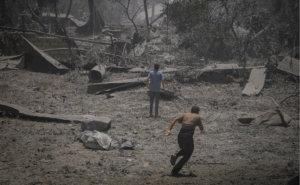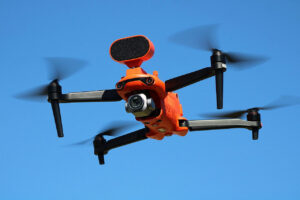‘Like a video game’: Israel enforcing Gaza evacuations with grenade-firing drone

Palestinians at the site of an Israeli airstrike in the Jabalia area, northern Gaza, 1 June 2025
Yuval Abraham reports in +972 on 10 July 2025:
The Israeli military has weaponized a fleet of Chinese-manufactured commercial drones to attack Palestinians in parts of Gaza that it seeks to depopulate, an investigation by +972 Magazine and Local Call can reveal. According to interviews with seven soldiers and officers who served in the Strip, these drones are operated manually by troops on the ground, and are frequently used to bomb Palestinian civilians — including children — in an effort to force them to leave their homes or prevent them from returning to evacuated areas.
Soldiers most commonly use EVO drones, produced by the Chinese company Autel, which are primarily intended for photography and cost around NIS 10,000 (approximately $3,000) on Amazon. However, with a military-issued attachment known internally as an “iron ball,” a hand grenade can be affixed to the drone and dropped with the push of a button to detonate on the ground. Today, the majority of Israeli military companies in Gaza use these drones.
S., an Israeli soldier who served in the Rafah area this year, coordinated drone attacks in a neighborhood of the city that the army had ordered to be evacuated. During the nearly 100 days that his battalion operated there, soldiers conducted dozens of drone strikes, according to daily reports from his battalion commander that +972 and Local Call reviewed.
In the reports, all Palestinians killed were listed as “terrorists.” However, S. testified that aside from one person found with a knife and a single encounter with armed fighters, the scores of others killed — an average of one per day in his battalion’s combat zone — were unarmed. According to him, the drone strikes were carried out with the intent to kill, despite the majority of victims being located at such a distance from the soldiers that they could not have posed any threat.

An Autel EVO drone at Embry-Riddle Aeronautical University, Florida, 2 February 2024
“It was clear that they were trying to return to their homes — there’s no question,” he explained. “None of them were armed, and nothing was ever found near their bodies. We never fired warning shots. Not at any point.”
Because the Palestinians were killed far from where the soldiers were positioned, S. said that their corpses weren’t collected; instead, the army left them to be eaten by stray dogs. “You could see it on the drone footage,” he explained. “I couldn’t bring myself to watch a dog eating a body, but others around me watched it. The dogs have learned to run toward areas where there’s shooting or explosions — they understand it probably means there’s a body there.”
Soldiers testified that these drone strikes are often carried out against anyone entering an area the army has determined is off-limits to Palestinians — a designation that is never demarcated on the ground. Two sources used variations of the phrase “learning through blood” to describe the army’s expectation that Palestinians will come to understand these arbitrary boundaries after civilians are killed upon entering the area.
“There were many incidents of dropping grenades from drones,” said H., a soldier who served in the Nuseirat area in central Gaza. “Were they aimed at armed militants? Definitely not. Once a commander defines an imaginary red line that no one is allowed to cross, anyone who does is marked for death,” even just for “walking in the street.”
In several cases, S. said, Israeli troops deliberately targeted children. “There was a boy who entered the [off-limits] zone. He didn’t do anything. [Other soldiers] claimed to have seen him standing and talking to people. That’s it — they dropped a grenade from a drone.” In another incident, he said, soldiers tried to kill a child riding a bicycle a great distance away from them.
“In most cases, there was nothing you could tell yourself,” S. continued. “There was no way to complete the sentence, ‘We killed them because…’”
A., an officer who was involved in operations around Khan Younis this year, said that a primary goal of these attacks was to ensure that neighborhoods were emptied, or remained empty, of Palestinians. In June, his unit flew a drone into a residential area that the army had ordered to be evacuated the previous month. Soldiers stood at the city’s outskirts, watching a small screen showing live footage from the drone to see who was still in the neighborhood.
